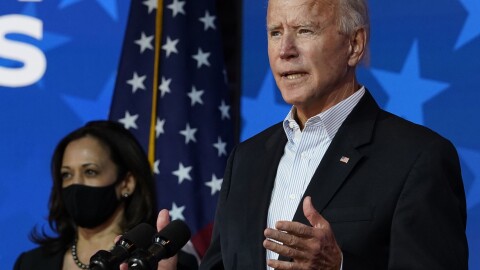Updated at 10:06 a.m. ET
"I am honored to announce that the United States will remain a member of the World Health Organization," Dr. Anthony Fauci said Thursday, informing the WHO's executive board that President Biden has reversed former President Donald Trump's move to leave the U.N.'s health agency.
The U.S. will also fulfill its financial obligations to the WHO, Fauci, chief medical adviser to the president, said, as well as cease a drawdown of U.S. staff who work with the organization.
The U.S. relationship with the WHO is "one that we value deeply and will look to strengthen going forward," Fauci said.
Biden has sent letters to retract Trump's withdrawal to the U.N. secretary-general and to WHO Director-General Tedros Adhanom Ghebreyesus, Fauci said, addressing Tedros as "my dear friend."
Tedros responded on Twitter, "Thank you my brother Tony for leading the delegation" at the executive board meeting and for announcing the renewed U.S. support for the WHO.
Tedros also welcomed Fauci, the head of infectious diseases at the National Institutes of Health, to his new spot on the executive board. Previously, Assistant Secretary of Health Adm. Brett Giroir had represented the U.S. on the board, as the world fell into the grip of a pandemic.
"This is a good day for WHO and a good day for global health," Tedros said. He praised Fauci for his "incredible leadership" on COVID-19, adding that for the world, the U.S. role in public health is "very, very crucial."
"And I send my deep thanks and my warm congratulations to President Biden and Vice President Harris, and to the American people," Tedros added.
Fauci's remarks were a seismic shift from the criticisms leveled at the WHO by Trump, who had threatened to put a permanent hold on U.S. funding for the agency unless it agreed to substantial changes. Many of Trump's complaints about the agency centered on its handling of COVID-19 and its relationship with China. He also accused Tedros of waiting too long to declare COVID-19 a public health emergency.
Fauci did not refer to any of those criticisms directly in his speech to the WHO's virtual meeting. But he did say the U.S. will work with the organization "to strengthen and reform the WHO, citing goals such as improving how the world responds to health emergencies and expanding pandemic preparedness.
An international investigation into the origins of a coronavirus that has now killed more than 400,000 people in the U.S. and 2 million people worldwide must be "robust and clear," Fauci said.
"We are committed to transparency, including those events surrounding the early days of the pandemic," he said. "It is imperative that we learn and build upon important lessons about how future pandemic events can be averted."
Fauci also said the U.S. will join the international COVAX initiative, which is meant to distribute COVID-19 vaccines and therapies to low-income countries. He added that Biden will issue a directive about that move on Thursday.
The 180-degree U.S. policy shifts — both to remain in the WHO and to join COVAX — are "important steps toward reestablishing America's leadership in global health," said UNICEF USA President and CEO Michael J. Nyenhuis.
"American inclusion in COVAX will help ensure that UNICEF and partners can equitably deliver vaccines to low-income countries," Nyenhuis said, "and help protect children from the ravaging impacts COVID-19 has had on their health, education, and well-being."
Copyright 2021 NPR. To see more, visit https://www.npr.org. 9(MDA5NTM4MTIyMDE0MTg3NDc2MTVlZjdmNQ001))





